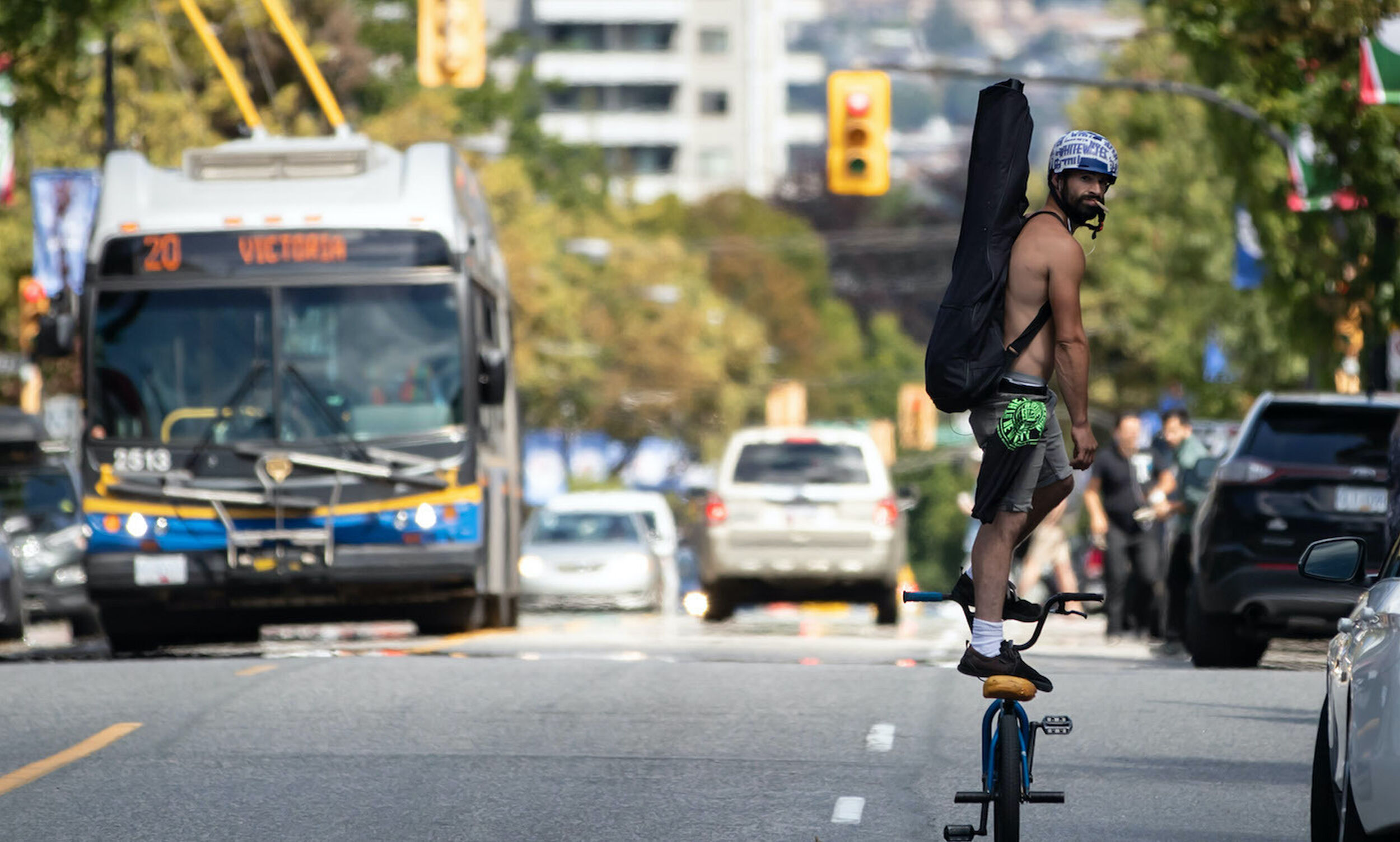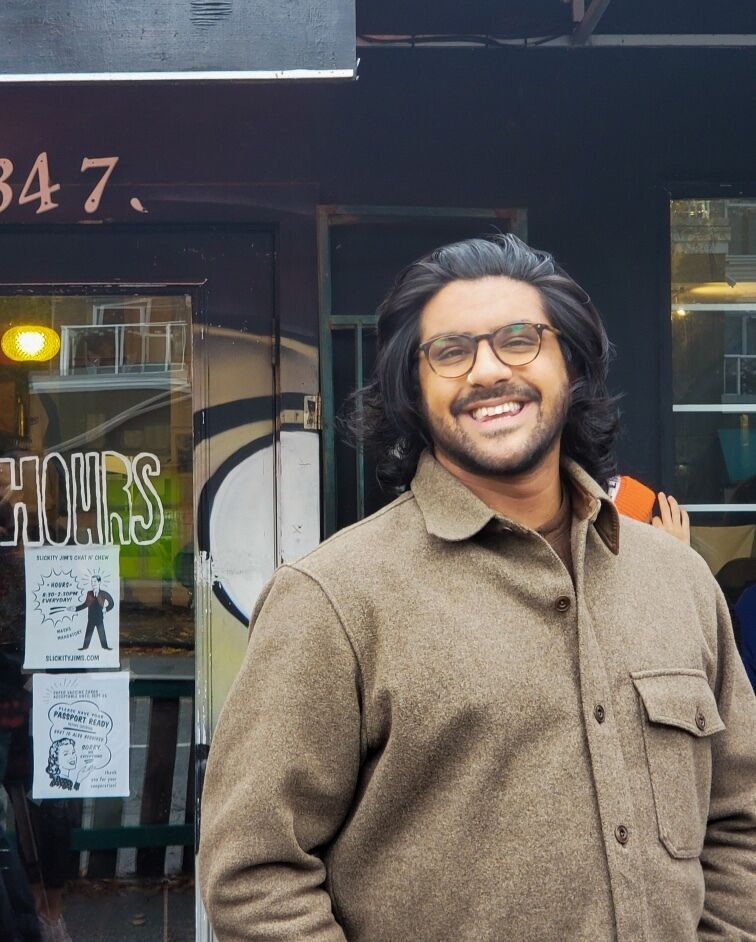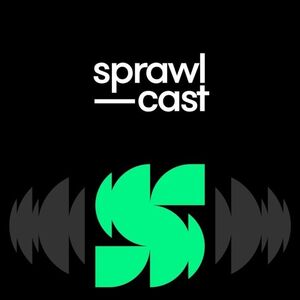
Commercial Drive in Vancouver. Photo: THE CANADIAN PRESS/Darryl Dyck
What can we learn from Vancouver’s Commercial Drive?
‘Homogeneity is highly overrated,’ says Zakir Suleman.
Sprawlcast is a collaboration between The Sprawl and CJSW 90.9 FM. It's a show for curious Calgarians who want more than the daily news grind. Subscribe on iTunes, Spotify or wherever you listen to podcasts. Thanks to our members, we also provide a written version of each episode for those who would rather read than listen.
It’s one of my favourite places to visit: Commercial Drive in Vancouver.
Every summer, my family heads west to see my wife’s family. And every time, going to Commercial Drive is one of my highlights. What strikes me there is the mix of people. On the Drive, you have people from all walks of life, all rubbing shoulders with one another. It feels like everyone has a place. It’s colourful and vibrant and wonderfully human. I like just being there and taking it all in.
Now, I’m probably romanticizing it a bit. It’s easy to do that with other cities—viewing them as the ideal, and viewing our own local community as uniquely deficient. In a way, our own city and neighbourhood can be the hardest to see, the hardest place to be truly present. It’s so easy to seek escape elsewhere. And the reality is that Vancouver has the same disparities that we have in Calgary—and has some problems that are even worse, like the unaffordability of housing.
Even so, it can be useful to look elsewhere for fresh insights into our own city. Sometimes another place can illuminate what we struggle to see here at home, or maybe it sparks our imaginations in new ways. It can shift our perspective just a bit. And I get that sense when I’m on Commercial Drive. I catch a glimpse of the richness that comes with a truly diverse neighbourhood. I feel a sense of wonder, even if it’s just for an afternoon.
To find out more about what makes this many-layered neighbourhood work, I spoke with longtime community member and organizer Zakir Suleman. A few years ago, when he was a philosophy student at UBC, he was involved in something called The Belonging Project. The idea was to explore how people find a sense of belonging in Vancouver—a city where many people find it hard to build connections with each other.
Here is some of our conversation, lightly edited for clarity and brevity. (This is a partial transcript—you can hear the full conversation in the episode.)

What brought you to the Commercial Drive area in the first place?
I was born and raised on the Drive. So, for me, it's been the place that I've always grown up with and known. I've moved around a bit but my family still lives around the Drive, and I'm around the Drive quite a bit. The whole street is sort of like a living room—a neighbourhood living room.
How would you describe it to somebody who's never been there?
It's this kind of light hill that you walk up, and as you're walking, there are these coffee shops. You're walking by people who look very arty, or maybe they're older Italian or Portuguese folks. There are a lot of punks around. It feels active when you're walking through the whole place. There's a lot going on, there are people playing music, and coffee everywhere. And people just really engaging in a kind of outward and unique way of living, I think. Maybe not in the world, but definitely unique for Vancouver.
If we talk about the things that really enable Commercial Drive, it’s waves of immigration, it’s affordable housing stock and density.
When you were growing up there, did you have that sense of this being a unique neighbourhood? Or was it just like, "Hey, this is where I am and this is what life is like?”
I was just always kind of confused as to why the rest of Vancouver didn't feel like Commercial Drive. On Commercial, it's really common to know people and to say “hi” to people, and at least know people by face if not name. You can walk down the street and see the same group of people without it being creepy. People just going about their lives. And so going about the rest of Vancouver, it always felt really different.
As you were growing up along Commercial Drive, what were some of the things you liked about it?
Maybe the best way to do it is to give you an average day in my memory from when I was 15.
I wake up and roll blearily out of bed into a coffee shop where I know the people there. They're saying "hi" to me, and we're catching up. We sit on the kind of patio and watch people go by. There are all these characters around, right? It's kind of like they're doing a bit, but not really. That's what they do. For a while, there was this guy who had this schtick where he would play bagpipes while wearing these mechanized three-foot goat stilts. So, he would just be walking around, on the way to play in front of the liquor store or wherever.
I went to elementary school there, I went to high school there, so I'd be running into friends and then go about my day. And all the way through, it's just pervaded with these connections.
It’s just about living together and giving each other a modicum of grace.
And I think the most interesting thing is just what those connections are. It's the older Italian guys who remember me from when I was a kid watching football, or the guys that hang out in front of Joe's and drum. I've never known their names, but we kind of just know each other on sight, you know what I mean? Or the arty types—the guy who's a comedian, somebody who's a musician. Somebody who's a fisherman. People who are working and doing different jobs around town.
And that's just normal. Normal to bump into people. And maybe not know everything about everybody's life, but just to have a sense that these are people around. They're community members.
I'm very much an outsider, but one thing that always strikes me is that it feels like a place where anyone can fit in. It feels like that kind of place—where no matter how weird you are, there's a place for you here.
Yeah, it's kind of a collection of oddballs, but it depends what we mean by oddball. I mean, there's mechanized bagpipe goat guy, but there's also—especially growing up, a little less so now because they've all gotten quite a bit older—there'd be all these Italian folks.
These relationships only exist in the neighbourhood. They exist because of a shared space, and they exist because of shared interests. And so, when people's lives are lying on top of each other and layering, you get led into these things, these increasingly intimate things about people's lives. And I think that's kind of what it means to live in community. It's not necessarily voyeuristic. It's intimate.
You see people in different states of undress. They're coming to and from something, they're half awake, they're hungover, they're whatever. And you know that you are also going to be just as hungover or just as raggedy. And it's just about living together and giving each other a modicum of grace.
When people’s lives are lying on top of each other and layering, you get led into these increasingly intimate things about people’s lives.
I was struck by something you said in the Vancouver Observer when you were working on the Belonging Project in 2015: "Growing up here, it's impossible not to run into people who are wildly different from you, and it's easy to find a space to belong when everybody's really different."
I find that so interesting. I don't know about Vancouver, but in Calgary, one of the tensions in neighbourhoods, especially as there are redevelopment pressures and whatnot, is that a lot of them become really insular, and kind of defined by a certain sameness. And they come to believe that they've got to preserve that sameness in order to keep their community “character.”
But what you're describing is very different than that—where people are different, and because of that, you find a space to belong.
I think it's really important to name the thing in the room, which is that we live in a world in which there is a neoliberal capitalist way of dealing with things. Everybody has to make money, everybody is always anxious, there are crises all over the place. It's not an environment in which the idea of community grows very well, because people become disposable.
I mention that because when we treat space as something that's worth speculating on and creating profit out of, we end up treating community as instrumental. Community becomes a branding bit in the neighbourhood guide. It's marketing materials about building community.
Actually, building community is messy. People aren't clean. People are icky. And that's great! That's good. People have lots of different things that they want and that they like. And so when you create a space where it's permissible to be different and to be divergent, and to have your bit that you're doing, people have a baseline for dealing with each other. They might not always be happy or kind. The idea of community is not something where you're safe 24/7 in any kind of community.
I think homogeneity is highly overrated. There's this idea of homogeneity being somehow safer or cleaner or nicer, when life, in my opinion, is heterogenous. It is flourishing and different. When you look at a place like Commercial Drive, you see that it's kind of in the air. And it is what makes that place special.
There’s this idea of homogeneity being somehow safer or cleaner or nicer, when life, in my opinion, is heterogenous.
Different things draw that out. If you go down Commercial Drive now, you'll see a big decal in the middle of the street that says "Every Child Matters." We had those stories that came out about all the Indigenous kids that were found buried at residential schools around Canada. That decal is something that happens because there's a lot of people in the neighbourhood that come together to exert a common force.
When Remembrance Day happens—lots of people are anti-war in the neighbourhood. It doesn't mean people don't come out to pay respects to veterans out there. The anti-war people are like, "There should never be war," and the veterans are like, "We served in a war." And there's enough commonality there to be like: We can pay respect.
It’s dialogue, having a meaningful back-and-forth conversation. And this is at a loss. I mean, the reason we're having this conversation, at least in part, is because Commercial Drive is abnormal in some way compared to other places. And I think it's worth investigating why that is.
Yeah, and I'm curious about that. You mentioned the forces that threaten a place like this. The housing market, where people are basically priced out of their homes and out of a neighbourhood. Commercial Drive does feel almost like a bastion of resistance against these forces. How have people staved that off?
I mean, I think that assumes people have staved it off. Everything is about housing here, one way or another. It's sort of a meme at this point. But one of the things that enables Commercial Drive to exist is that there's co-op and subsidized housing. There are apartment blocks that are dense, there are places where people who can’t afford a single family home or a brand-new condo to rent or buy can live. And that's what really enables it.
If we talk about the things that really enable Commercial Drive, it's waves of immigration, it's affordable housing stock and density. And it's common space and common ground.
Building community is messy. People aren’t clean. People are icky. And that’s great! That’s good.
You asked about how it's staved off. I've been a part of some organizing around these things in the past, but I think the answer is that it's actually really hard to stave it off. Frankly, there are a lot of things that threaten Commercial Drive even now in terms of the way that new developments are being built in the area.
But also, this idea that Commercial Drive or something like that has to be protected, like it's an oasis or some kind of special thing—I don't think that's the case. I think that these places survive over time and on a human time scale. The way that I recollect Commercial Drive as a kid is gone. That doesn't exist. It doesn't exist because when I was a kid, there were four or five coffee bars where you could go. There'd be a bunch of old Portuguese guys, Italian guys, Brazilian guys, whatever, and they would all be watching whatever game was on and having espresso. Mario, who used to run one of the coffee shops on the Drive, couldn't afford the rents today if he was still alive. It's just the case that the cost of land drives up the gentrification of the things that are there.
But it exists in some of those moments that I was talking about earlier like Remembrance Day, like people coming together around the kids in the residential schools, and stating, "This is wrong." Whether they're Indigenous, whether they're settlers, pretty much everyone can get behind that. And the neighbourhood did.
Just as I wouldn’t want some homogenous enclave, neither would I want a community that was in amber.
All that to say: Change isn't a bad thing. But I think community only exists with certain preconditions, and when you start to mess with those preconditions, then it gets harder. And that's another thing that's happening in the neighbourhood. As single-family home costs go up, there's more and more younger families, whiter, folks who would be in other parts of the city previously, who are moving in. It's not a bad thing that they're there, but it does change the character of the neighbourhood or what people are catering to there.
At the same time, there's still enough of a common thread. It's not either/or. Just as I wouldn't want some homogenous enclave, neither would I want a community that was in amber.
Jeremy Klaszus is editor-in-chief of The Sprawl.
Support in-depth Calgary journalism.
Sign Me Up!We connect Calgarians with their city through in-depth, curiosity-driven journalism—but can't do this alone! We rely on our readers and listeners to fund our work. Join us by becoming a Sprawl member today!

